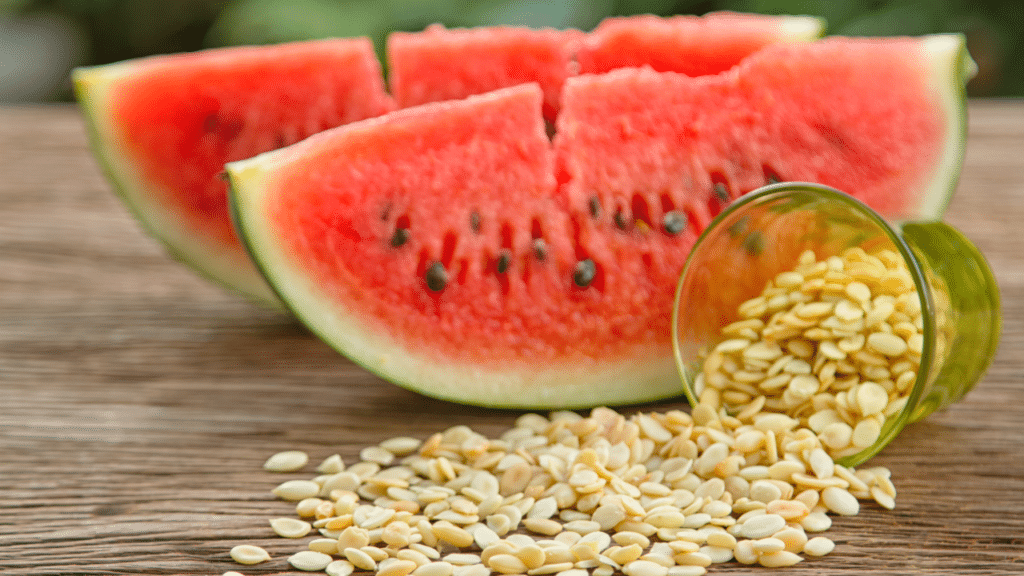A Protein Powerhouse: Watermelon Seed Benefits for Plant-Based Diets
Let’s talk about watermelon seed benefits.
Watermelon Seed Benefits Quick Digest (no pun intended)
All About Watermelon Seed Benefits
Here’s the scoop on those tiny black seeds you might be spitting out:
What does watermelon seed do to the body?
Watermelon seeds are a surprising nutritional powerhouse.
They’re packed with:
Magnesium:
Crucial for energy production, nerve function, and blood pressure regulation.
Healthy Fats:
May help lower bad cholesterol and protect against heart disease.
Zinc:
Supports a healthy immune system and cell growth.
Folate:
Important for cell growth and development, and may reduce the risk of certain birth defects.
These nutrients contribute to various health benefits, like improved heart health, blood sugar regulation, and a potential boost to your immune system.
If you take away one thing from this informational blog post, let it be this!
First and foremost, watermelon seeds are an excellent source of protein.
Protein is an essential macronutrient that plays a vital role in building and repairing tissues, producing enzymes and hormones, and supporting a healthy immune system.

Just a small handful of watermelon seeds can provide a significant amount of protein, making them a great snack option for those following a plant-based or vegetarian diet.
Heart-Healthy Fats: How Seeds Can Improve Your Cholesterol
Additionally, watermelon seeds are a rich source of healthy fats.
These seeds contain both monounsaturated and polyunsaturated fats, including omega-6 fatty acids.
These fats are known for their heart-healthy properties and can help lower bad cholesterol levels, reducing the risk of heart disease and stroke.
Incorporating watermelon seeds into your diet can be a simple and tasty way to increase your intake of these beneficial fats.
Essential Nutrients in Every Bite: Watermelon Seeds’ Rich Vitamin and Mineral Content
Furthermore, watermelon seeds are a great source of vitamins and minerals.
They are particularly high in magnesium, which is essential for maintaining normal nerve function, regulating blood pressure, and supporting a healthy immune system.
Magnesium also plays a crucial role in promoting healthy bones and teeth, making it a vital nutrient for everyone, especially growing children and aging adults.
Watermelon seeds are also rich in iron, a mineral that is essential for the production of red blood cells.
Iron deficiency can lead to anemia, causing fatigue, weakness, and difficulty concentrating.
Including watermelon seeds in your diet can help prevent iron deficiency and ensure that your body has an adequate supply of oxygen-carrying red blood cells.
Defending Against Free Radicals: The Antioxidant Boost of Watermelon Seeds
In addition to these essential nutrients, watermelon seeds are a great source of antioxidants.
Antioxidants are compounds that help protect our cells from damage caused by harmful free radicals.
Free radicals are unstable molecules that can lead to chronic inflammation and various diseases, including cancer and heart disease.
By consuming foods rich in antioxidants, such as watermelon seeds, we can help neutralize free radicals and promote overall health and longevity.
Kidney Health and Diuretic Properties of Watermelon Seeds
Moreover, watermelon seeds have been shown to have diuretic properties, meaning they can increase urine production and promote healthy kidney function.
This can be particularly beneficial for individuals suffering from conditions such as urinary tract infections or kidney stones.
By increasing urine output, watermelon seeds can help flush out toxins and waste products from the body, reducing the risk of urinary tract infections and improving overall kidney health.
Digestive Health and Fiber: Support a Healthy Gut
Lastly, watermelon seeds are a great source of dietary fiber.
Fiber is essential for maintaining a healthy digestive system and preventing constipation.
Adequate fiber intake can also help regulate blood sugar levels, promote weight loss, and reduce the risk of developing chronic diseases such as diabetes and cardiovascular disease.
Adding watermelon seeds to your diet can provide a good amount of fiber, aiding in digestion and supporting overall gut health.
The Bottom Line on Watermelon Seeds
In conclusion, the benefits of watermelon seeds are numerous and diverse.
They are a rich source of protein, healthy fats, vitamins, minerals, antioxidants, and fiber.
Including watermelon seeds in your diet can contribute to a well-rounded and nutritious eating plan, supporting overall health and wellness.
So, the next time you enjoy a juicy slice of watermelon, don’t forget to save and enjoy the seeds – your body will thank you!
Health Benefits of Watermelon Seeds FAQs
Can I eat raw watermelon seeds?
Absolutely!
Raw watermelon seeds are perfectly safe to eat.
However, some people find the texture a bit unpleasant.
Roasting or drying them can make them crispier and more enjoyable.
How many watermelon seeds should I eat a day?
There’s no one-size-fits-all answer, but moderation is key.
A handful (around 1 ounce) is a good starting point.
Remember, watermelon seeds are calorie-dense, so factor them into your daily intake.
What are the benefits of watermelon seeds to manhood?
While there’s limited research on watermelon seeds specifically for men’s health, the nutrients they contain can offer general benefits:
Zinc:
May play a role in testosterone production and sperm health.
Protein and healthy fats:
Support overall health and well-being, which can indirectly benefit male fertility and sexual function.
Disclaimer:
It’s important to note that watermelon seeds are unlikely to be a magic bullet for any specific health concern. If you have questions about your individual needs, consult a healthcare professional.

